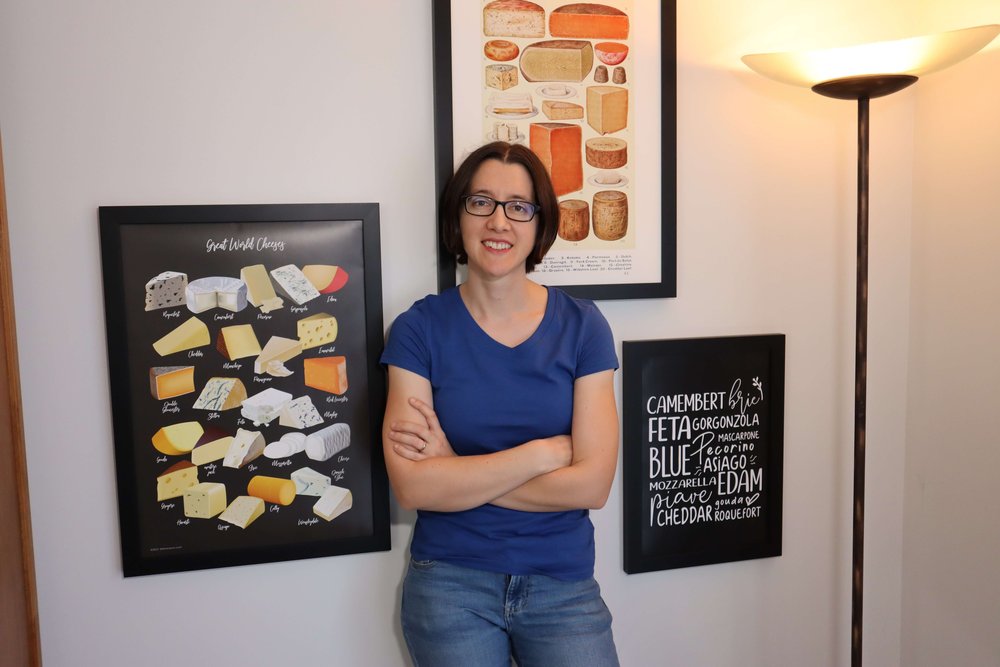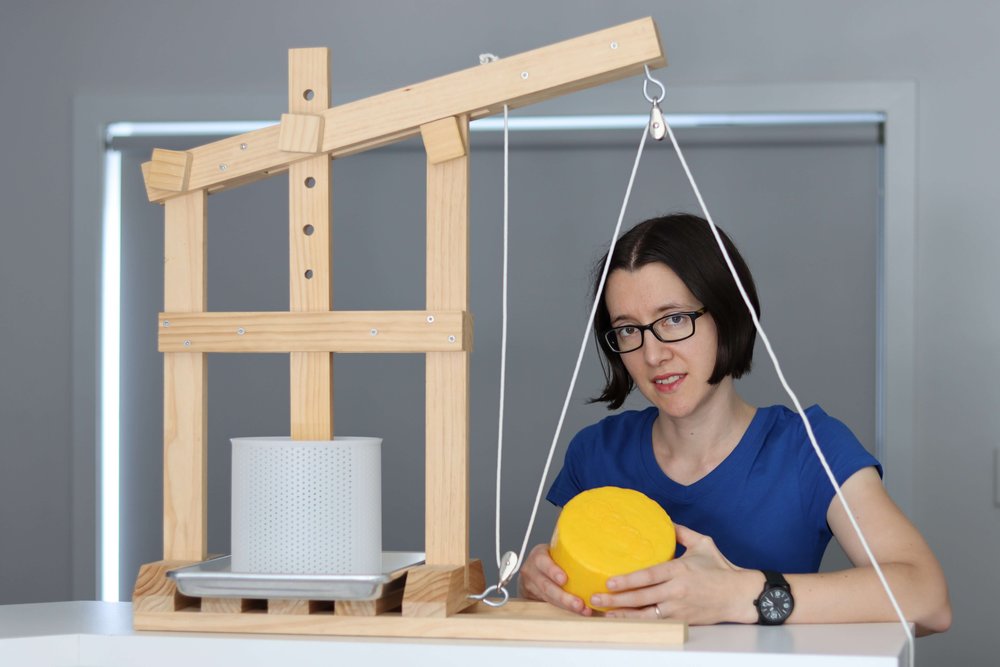Julia van den Brink on her set for the Cheese History channel
“Hey there Cheesestorians! I’m Julia and welcome to Cheese History, a channel about the origins, history, and impact of cheese,” so begins most of the videos on the Cheese History channel. Since early 2021, Julia van den Brink has been plumbing the depths of historical cheese topics in videos she produces from her home in New Zealand. As she takes viewers on a monthly journey to unwrap the secrets behind cheeses such as Camembert, Roquefort, and Feta, she delights in debunking the popular myths of their origin stories.
In her mozzarella video she traces the birth of the cheese to 15th century Naples, Italy and cites the first-time the stretchy cheese was called mozzarella in a collection of banquet recipes from 1570. In other videos, she travels farther back in time and examines cheese making in Ancient Egypt and Greece or tackles such questions as “Was cheese a health food in Ancient Rome?” We spoke to her to learn how she got into cheese history and the evolution of her series.
What prompted you to delve into cheese history?
I’ve been interested in history ever since my teens. I enjoyed reading historical fiction and wanted to look at the actual the history of the time and before you know it, it snowballed, and I was deep into European military and political history.
When I recently tried to make my own mozzarella and found that quite fun, I went looking for more on the history of cheese and found an absolutely brilliant book called Cheese and Culture by Paul Kindstedt. I read it through quickly and thought, this is amazing. I need more of this. At that time, it was harder to find nice information like his on the subject. And since I was only working part time [as a Theology educator] and there was a pandemic going on and we were constantly going into lockdowns, there was nothing else to do. So, I thought, well, if no one else is going to do it, I will.
At the end of most videos, you give a list of sources including things like The Roman Cookery of Apicius, and the European Geographical Indications Register. I imagine you have a large library now?
It’s getting bigger. I keep finding more and more books on the history of cheese, and if I can get hold of them, I do. I have about 20 or 30 now. Some have obscure topics, like a whole book about the national myth of Camembert.
How many hours of research do you typically do for each video?

A lot. I try and put out one video a month, working 1 and a half to 2 days a week. I spend more than half of that time researching and compiling what I want to say, then filming, and editing. It depends on the subject. I’m working on Cheddar right now and that’s been the last 2-3 months. There will be a second part because I keep finding more information to follow up on. I end up in some really obscure places.
You seem to enjoy being a myth buster?
It seems to be turning out that way. I’ve found that cheeses have all these origin myths. It started with the myth of how we learned to make cheese that Paul Kindstedt debunked in his book. Almost every time I research the history of a particular cheese, I do the compulsory Wikipedia search and they almost always start the history section with how it was first discovered or how it was invented. Then I go and see if that story actually has any foundation in reality. Sometimes it turns out that it’s right, but other times no.
Do you have a favorite episode?
That would be Camembert (How myths and marketing made Camembert famous). There is this crazy back story that it came about when a fleeing priest from Brie stopped off in the town of Camembert in 1791 and taught [a local townswoman named] Marie Harel to make cheese in the brie tradition which she then made in the [smaller] local sized cheese mold. But this was really a brilliant marketing ploy by her grandsons to make their cheese sell. That’s impressive. There’s actually no record of that story happening. There were a few priests who went through Camembert, but the dates don’t quite line up. It would be so cool if it was true, but the truth has been expanded upon and made into such a great story. Marie Harel did exist, and she probably had a big impact on camembert but then her grandsons took it and ran with it when the time was right to spread camembert throughout France. We’re not really quite sure what the truth is. Because the myth has taken over and it’s hard to disentangle the two.
How do you plan which cheese to highlight next?
I started with the more popular, more well-known cheeses (brie, Camembert, Gouda, Cheddar.) I began with mozzarella and went softest to hardest. Other videos do not focus on a particular type of cheese but deal with interesting topics that capture my attention or suggestions from some of my viewers, such as The Role of Dairy Women as Cheesemakers in Europe Since the Middle Ages , or how two American presidents, Thomas Jefferson and Andrew Jackson, were both presented with enormous cheeses by their supporters.
Do you consider yourself to be a cheese detective?

I like researching and finding out new stuff. When things capture my attention, I go all in. I have to find out as much as possible until I’ve satisfied that desire to know something about whatever it is. Cheese history is interesting, because it’s not just as simple as going to get a book, you have to put all the pieces of a puzzle together to try and make sense of what’s going on. Especially with less being written on the subject, you end up in strange places looking for information on the history of cheese.
What kind of strange places?
For the history of Cheddar, I was in the pipe rolls of Henry the 2nd, which are like his financial records for each year. There was supposedly in there a mention of Cheddar, and it was written in abbreviated Latin. Quite challenging to decipher. I think I found the entry which may or may not actually be about Cheddar, but it was definitely about a cheese made in Somerset.
What are your future plans?
I have a massive list of cheeses. But the more obscure the cheese, the harder it is to find out about it. I may focus more on particular countries and their cheese history, as I did in a couple of videos on New Zealand cheese because I happen to live here and learned my own history.
